|
|
|
Musical Pathways Foundation Newsletter April 23 - 29
|
|
Dear (Contact First Name)
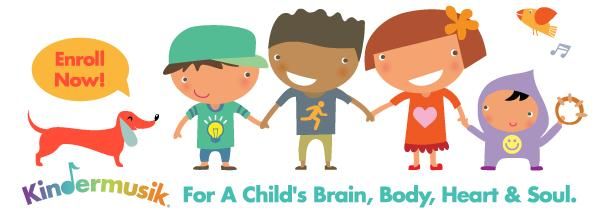 We know it can be a little crazy this time of year, and if you haven't registered yet, we wanted you to know that we still have openings for Summer Private Lessons (piano, violin, voice, guitar), Summer Kindermusik Adventures Camps, and Group Voice, Violin and Piano Classes (scroll to bottom). We know it can be a little crazy this time of year, and if you haven't registered yet, we wanted you to know that we still have openings for Summer Private Lessons (piano, violin, voice, guitar), Summer Kindermusik Adventures Camps, and Group Voice, Violin and Piano Classes (scroll to bottom).
For current students, reserving your spot is super easy. All we need to know is how many lessons you would like to take this summer (3, 6, 9, 12 or anything in between!). You don't even need to know your summer schedule at this point. Your teacher will chat with you, and he/she can help you figure out how you might like to experience your "summer sampler." So click HERE to act now and hold your spot!
Summer is a great time for new students to begin lessons for the very first time as well. You might consider starting with an introductory group camp like Blast Off with Piano!, Beginning Violin, or have your little singers enjoy a week of Broadway Kidz! or just jump right in with Private Elite Artistry lessons. Click any of the above links to read more, and/or register.
In addition to private lessons, we're delighted to be offering an exciting variety of Kindermusik Summer Adventures Classes for 0 to 7 yrs as well.
Summer is the perfect time to explore and reap the benefits of the fine arts. We promise a fun learning experience with awesome instructors and lots of flexibility in scheduling! Can't make every week of your camp? We offer FREE make-up classes. We are all looking forward look forward to seeing you around.
Have a Musical Week!
Betsy
_____________________________________________________________________________
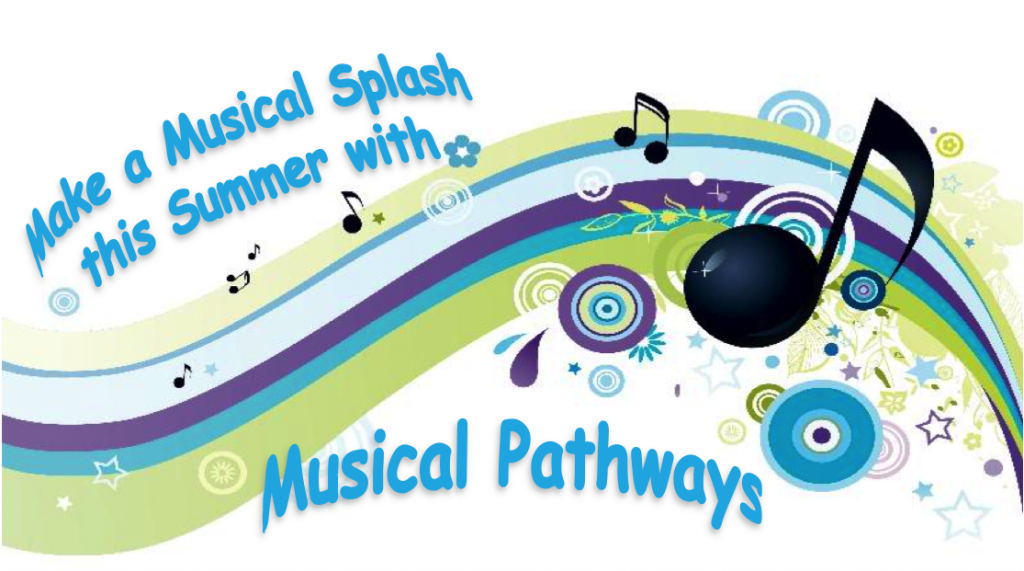
Prefer To Download a Registration Form?
Click Here

|
| |
EARN $15
TUITION
EACH -
NO LIMIT!
|
PERFECT TIME TO REFER A FRIEND!

Kindermusik and Elite Artistry are for Every Child!
Earn Referral Credits as a thank you from the Foundation! Our Foundation exists due to the referral of your friends, neighbors, acquaintances, coworkers and family! Invite a friend to try a FREE CLASS with you sometime, or they can call us directly to schedule a visit that meets their scheduling needs.
When they join - you earn $'s toward your tuition!
| | All Referral $'s will be applied to tuition balances |
|
|
VILLAGE
The Rhythm of My Day
|
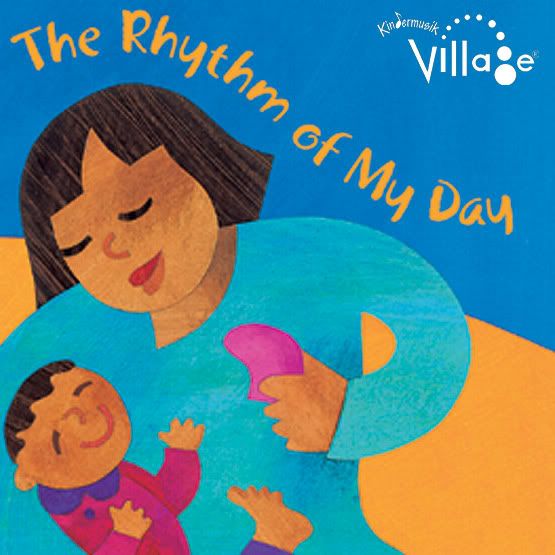 RHYTHM: SYNCOPATED FUN! Simply put, syncopation is a general term for a disturbance or interruption of the regular flow of rhythm; a placement of rhythmic stresses or accents where they wouldn't normally occur. Syncopation is used in many musical styles, and is fundamental in African derived styles such as funk, ska, reggae, ragtime, rap, progressive rock, and jazz. All dance music makes use of syncopation, and it is used in virtually all contemporary popular music.
 Much of this week's music contains syncopation, where a strong beat shifts and is less emphasized. Syncopation is used in much of the Caribbean music you hear on your CD, The Rhythm of My Day. When you move to syncopated music, you may feel yourself getting a little off-balanced. As you dance with your baby, he/she will also feel these patterns in the music. Moving to these different rhythms will help your baby make new neural connections and challenge his sense of balance and coordination. Much of this week's music contains syncopation, where a strong beat shifts and is less emphasized. Syncopation is used in much of the Caribbean music you hear on your CD, The Rhythm of My Day. When you move to syncopated music, you may feel yourself getting a little off-balanced. As you dance with your baby, he/she will also feel these patterns in the music. Moving to these different rhythms will help your baby make new neural connections and challenge his sense of balance and coordination. SUMMER ONLINE RESERVATION It's Not Too Late - Click Here HOME ACTIVITY SUGGESTIONS 1) Complete your Home Journal Week #3 -"Hello & Goodbye Rituals" Rituals not only provide a comforting sense of self-control for your child, but they allow your little one to feel the safety and security of your bonded relationship which is critical to maximizing your child's learning and guiding his/her behavior later on. Take just a brief moment (maybe 20 seconds) and look into your child's eyes, touch them and let them hear the love in a phrase/song they can later repeat to their child. - During class in our "Meet and Greet" groups we committed to "1 New Ritual" this week. GO FOR IT!
- Remember to continue your Hello Song and Goodbye Song rituals.
- Download the Rhythm of My Day PDF Journal
- Download your Rhythm of My Day Activity Packet
- Here are a couple of websites to help you in your ASL:Sign Language discovery. Signing Savvy and ASL Pro
- Hard-Copy Journal Books are available for $10 if you prefer a hard copy to downloading your PDF journal.
"For a child to develop a strong sense of self and self-esteem, he must see himself in relation to others. The child learns who he is through the eyes of the loving adults around him." - Simple Steps, by Karen Miller, pg. 15. 2) Have some SYNCOPATED fun dancing this week!Remember the saying, "Move your Baby to Learn, so eh/she can learn to move!" - Water Come A Me Eye (Our Move and Freeze Dance)
- Four White Horses (Our Exercise)
- Ally Bally (Even our new Rocking Song has up-beat syncopated stresses) FUN!
3) Continue to Listen - listen - listen to your NEW CD Your child will be comforted upon entering the busy classroom if they are familiar with the "sounds of Kindermusik."  THIS WEEK'S ADDITIONAL LEARNING POINTS FOR PARENTS LEARN TO MOVE
Baby needs to move his arms, legs and all body parts in order to gain control over them and make movements deliberate. "Move your baby to learn, so he can learn to move." - How to Have a Smarter Baby, by Dr. Susan Ludington-Hoe, pgs. 180-181 LABELING MOVEMENT "Children can recognize and object and understand movement long before they can use the language to tell you. We can help Baby in developing her ability to speak by labeling movement and objects. She will then begin to connect the relationship between the word and the movement or object. After months of babble Baby will begin to imitate these sounds and speak the words that previously she knew only by sight and sound." -How to Talk to Your Baby, by Dorothy P. Dougherty. P 34. ABOUT THE MUSIC Traditional Jamaican music is a rural folk form from the 19th century called mento. Mento is derived from the music of Africa and Europe to create this creole style of music as in Water Come A Me Eye. In this style there is usually a soloist improvising and leading with group participation. The complexity of music is dependent upon the improvisatory skills of the performers. |
STEADY BEAT is BRAIN FOOD!
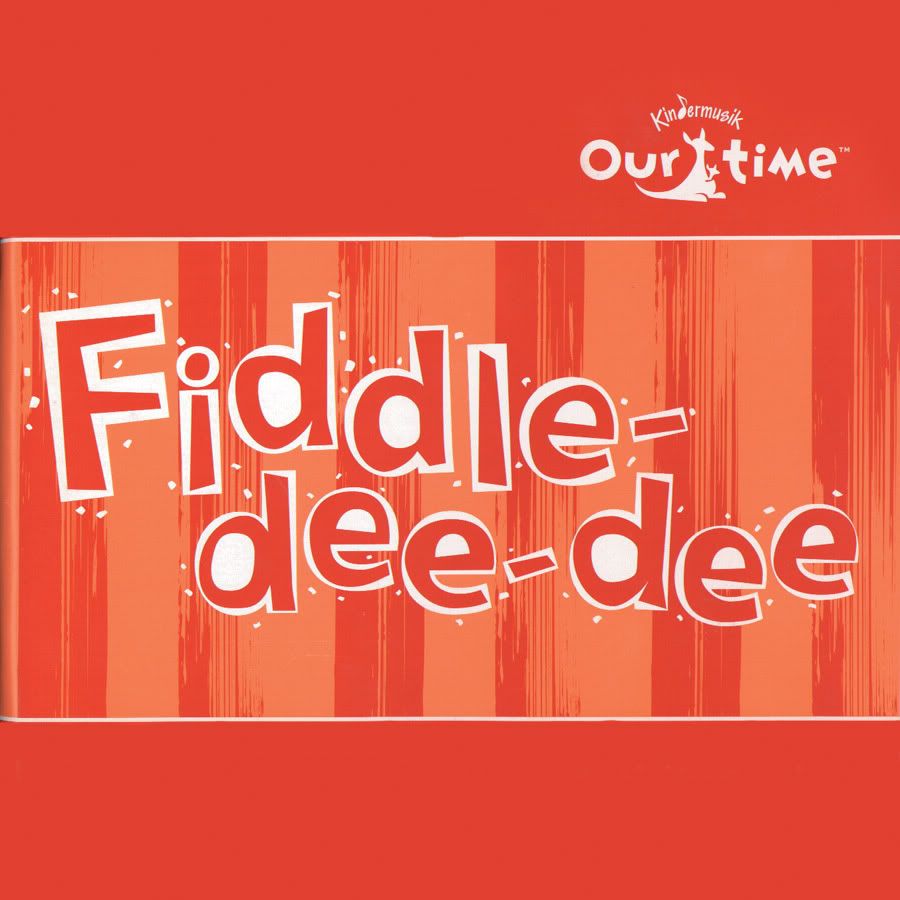
Did you know?
"An important concept underlying success in music is steady beat -- what some people refer to as rhythm. Steady beat is the consistent, repetitive, underlying pulse within every rhyme, song, and piece of music. Steady beat is felt, not seen or heard... Steady beat is not only musical, it serves as an organizer for the child, and is also calming.
The research carried out by High/Scope Educational Research Foundation (Timing in Child Development, Kuhlman & Schweinhart, 1999) shows a positive correlation of steady beat to reading, vocabulary, math, music, and physical coordination." (Phyllis Weikart, author and movement specialist)
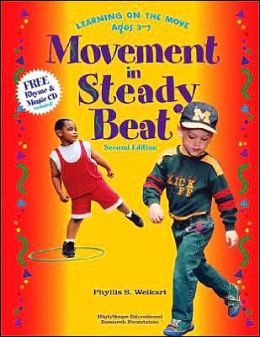 ADDITIONAL VALUE FOCUS INFORMATION ADDITIONAL VALUE FOCUS INFORMATION
Steady Beat Correlates to IQ
Why do we visit Steady Beat in EVERY class for 7 years? Our reasons reach well beyond the musical benefits. By your moving and playing with your child, you can and will see lasting lifelong developmental benefits!
HOME ACTIVITY SUGGESTIONS
1) Choose from this wonderful list of Steady Beat Activities!
- Continue with "DONKEY & GOAT FUN" but this week add the STEADY BEAT
- Sweetly Sings The Donkey
- Steady Beat quiet & Loud
- Simultaneous bilateral with singing.
- Bazoo Bazoo Butz
- Lap Bounce Quiet & Loud
- Both Goat & Donkey Vocal Play
- Bangara Dance
- Scarf movement this week.
- Hush Little Baby w/ ASL
- 'Liza Jane'
- Tap or shake your Fiddlesticks to the beat
- Try tapping your Fiddlesticks in different ways. Tap them together or on the floor, or on your legs.
- Dickery, Dickery, Dare (Home CD 2, Track 6)
- Morning Song (Home Activity Book, p. 6,; Home CD 1, Track 2). 3)
- Hush Little Baby: Mobile and Card Play P. 18-21
- This may be our last week with Hush Little Baby, but you can continue the fun at home by making this mobile and playing this fun game.
- Explore body part or scarf steady beat dancing!
- Listen to our favorite Bangara Dance (Home CD 2, Track 16). Tap your toes; tap your nose!
- Even More Info on Steady Beat and How To Bring into Your Home!
- Fellow Kindermusik educator Debbie Mondale has a lovely page on her website about Steady Beat.
- Signing websites for you to encourage language through visual and motor involvement: ASL PRO, SIGNING SAVVY
2) Continue P.A.C.E. at home (Positive, Active, Clear, Energetic) and Enjoy the Left-Right Brain Rap!
Positive = Hook-ups/Stationary cross-lateral
Active = Cross Crawl/Moving cross-lateral/cross mid-lines
Clarity = Brain Buttons/Tarzan
Energetic = Hydrate
3) Continue Listening to your CD's
4) Click here for your copy of Our Time Helpful Guidelines for our newcomers this week
5) Click here for a copy of the Parent Class Handout for our newcomers this week

|
|
IMAGINE THAT
Cities! Busy Places - Friendly Faces!
|
AUDITORY DISCRIMINATION: Listening Part 3
"Early auditory enrichment with music enhances auditory discrimination learning.. . ."
*Institute of Cognitive Neuroscience, College of Life Science,
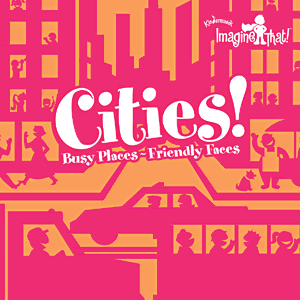
East China Normal University, Shanghai, China
"The development of auditory discrimination skills is a step-by-step developmental process. As children grow and develop, their ability to discriminate will also develop ....Children need to be provided with a wide variety of hands-on, developmentally appropriate activities that encourage them to note the similarities and differences among sounds."
*CDA Training Guide, High - Reach Learning. 2007.
Back in Week 3 with Traffic Jammers we created movements with our bodies to match the sounds/or timbres we were hearing. We also listened to We Are Fine Musicians and played instruments based on what we heard. Well, today in week #10 we have listened to bells and moved like bells and played bells. Now that your child has gained the experience with a bell-like timbre, we are taking the skill of listening to an even deeper level cognitively as we ask your child to CREATE the actual sound/timbre of a bell. This week they will use "hands-on" investigation and auditory discrimination skills to create their own instrument at home, as they will be comparing the sounds of the materials they are considering using, analytically designing an instrument that their brain will then recognize as "bell-like."
SUMMER ONLINE RESERVATION
It's Not Too Late - Click Here!
DEVELOPMENTAL FOCUS
Auditory Discrimination
 Auditory Discrimination Auditory Discrimination
is the ability to detect similarities and differences when listening to sounds, and includes the accurate registering of sounds or sequence of sounds that have been heard. The activities listed below in your Home Activity Suggestions can be used to strengthen auditory discrimination skills. Helping your child learn to focus and really listen to the nuances of sound is an ambitious, yet attainable goal . . . and one well worth the effort! In class, your little one listened closely and danced to a recording of Steeple Bells, helping him or her develop both attention and auditory discrimination skills.
Here is another reason to keep the early childhood classroom filled with music and movement! Did you know that the auditory system and vestibular system work together and are both processed in the ear? The more opportunities your child has to process vestibular information (e.g. moving in a variety of ways), the better he/she is able to differentiate sounds and discriminate sound and language.
Children who have difficulties with Auditory Discrimination may have*:
- problems identifying speech sounds
- poor listening skills, especially when there is background noise
- difficulty discriminating between similar words
- difficulty with rhyming activities
- poor articulation of sounds and words
- kinesthetic strengths (and learn better through using concrete materials and practical experiences)
- visual strengths (and enjoy learning through using visual materials such as charts, maps, videos, demonstrations
- good motor skills (and have strengths in design and technology, art, PE and games.
*Extracted from Teaching Expertise website: http://www.teachingexpertise.com/articles/activities-to-develop-auditory-discrimination-skills-1101 HOME ACTIVITY SUGGESTIONS 1) Week #10 Family Activity: "I am an instrument maker. My bells could look and sound like . . ." P. 13 - This week at home you can add another hands-on, creative aspect to complete the bell exploration.
- Have you ever made a bell? That's the family activity this week.
- As you assist your child in the family activity this week you'll help him/her use problem-solving skills, use auditory discrimination skills to differentiate among various sounds of materials and explore the possibilities of an instrument.
- Your family activity guide has ideas for your bell exploration fun. Enjoy!
- Reminder: Bring your Resonator Bars and Mallets to your next class!
2) 4 Simple Auditory Discrimination Games for Added Fun - What's That Sound? : Record a variety of household sounds onto a cassette or MP3 track and encourage your child to guess the source of each sound.
- Clapping Game: To play this game, your child must listen carefully! First, clap out a pattern such as clap, clap, clap. Your child must listen to the pattern and then repeat it. You can make this game as easy or as difficult as you would like.
- Sound Walk: Take your child for a Sound Walk! Before you leave, explain that he/she must be very, very quiet on this walk. Encourage your little one to listen for different sounds as they walk along. Upon returning home, have your child tell you a list of sounds they heard. Perhaps he/she could draw pictures of his/her favorite sounds.
- Sound Bingo: Kindermusik has an award-winning Sound Bingo game that is currently on sale at Kindermusik.com. I just followed the link and it is currently $11.50 plus shipping, but I noticed that Amazon has just cut their price from $16.99 to $12.16 with FREE shipping. This is an amazingly effective learning tool!
3) If new, Click here for your copy of Imagine That Helpful Guidelines for our newcomers this week. 4) If new, Click Here for a copy of the Parent Class Handout for our newcomers this week.

|
STACCATO AND LEGATO and CONCEPT LEARNING
"Concept learning is a cyclical process. The continued use of the specific idea in varied settings will help the learning to gel and contribute to a breadth and depth of understanding."*
*Developing Music Concepts, by Barbara J. Alvarez
This week is a terrific week for reviewing all previous concepts introduced this semester:
1) Singing Songs on Note Names
2) Reading Rhythms: ta, ti-ti, sh while singing
3) Playing Glockenspiels while singing note names.
As you review 3 of your children's most popular songs this week - Mouse Mousie, Bell Horses, and Lucy Locket - your child will be able to experience these concepts in a fun GAME environment. Remember: Your role as "Playmate" vs. "Instructor" provides both emotional bonding and lasting learning!
Staccato and legato are the concepts we are currently experiencing in class. The children are becoming experts at recognizing the difference between staccato and legato sounds! They can move accordingly when hearing the change from staccato music to legato music; they can play both types of sounds on their glockenspiels; and they can sing both staccato and legato. Maybe you can ask your child to singing one of their review songs either "Staccato or Legato?"
SUMMER ONLINE RESERVATION
It's Not Too Late! - Click Here
HOME ACTIVITY SUGGESTIONS
1) MAH #26: "Pick a Song Review"
- Play your Concept Review Game with your 6 Game Cards
- Enjoy Moving and Singing Staccato and Legato
4) Enjoy writing a "2 Measure" Composition this week
- 1 measure = 4 beats", he/she can use as many as "8" notes if they were all assigned the "ti-ti" rhythm. FUN! Review: tah = 1 beat, sh = 1 beat, ti-ti = 1 Beat
- Encourage the use of the 4 notes your child now knows. "c", "d", "a", and "f"
- Encourage use of Dynamic Markings:"p" - piano (quiet)"f" - forte (loud)"<" - crescendo (gradually louder)">" - decrescendo (gradually quieter)
- Now that we know about emotion, perhaps your child can indicate:
- Happy: Fast, Bouncy or
- Sad: Slow, Smooth
- REMINDER: Bring Your 2-Measure Melody to your Next Class
Just a little reminder that arrival @10 minutes before class if possible is your best bet. Plenty of time for a potty stop prior to class, and for the children to get their wiggles out! Class entry time @2 minutes prior as a group is an important piece of your child's classroom success. The extra "5 minutes" allows plenty of time for warm-up and transitioning for your child. We understand that circumstances do not always allow you to arrive 10 minutes before class, but we appreciate your efforts in general.

|
AFRICA (WEEK 4)
Introducing B-flat

Ah yes - Twinkle Twinkle needs a new bar on our glockenspiel! That bar represents a "b" that is lowered (flat), which is a black key on the piano.
We are also working on solidifying a syncopated rhythmic pattern in our bodies and ears. Syncopation is a rhythm in which a beat not normally emphasized receives emphasis. By speaking the word "syn-CO-pa-TA-ta" and stretching out the syllable "CO" it is possible to feel a syncopated rhythm. This is often a complicated rhythm for college students, but your child will know/feel/see/write this rhythm just as are first year college students.
It's been fun to hear the children playing their scales and tunes on the piano after class! They will be so well-prepared and excited to transition into Private instruction in either Piano, Violin, or Voice. If you and your child have not yet begun transferring your child's songs from glockenspiel to piano, now is the time to begin that fun transition. You will be amazed at how your child will be able to teach him/herself the piano.
.
SUMMER ONLINE RESERVATION
ELITE ARTISTRY PRIVATE LESSON
HOME ACTIVITY SUGGESTIONS
1) Music At Home Card 56:
- Glockenspiel & Singing: Activity Page 14a - Sing Twinkle Twinkle and eventually play & sing whole song
- Recorder: Activity 14b - Nigerian Boat Song
- Dulcimer: Tune your strings to the low c' on your glockenspiel and enjoy trying to figure out how to play Twinkle, Twinkle on your Dulcimer
2) Continue to write compositions: 2-Measure Melody (4 beats per measure).
3) Family Music-Making: How about a Trio? Invite your child to start arranging the music you are learning for multiple people.
- Mom on Glockenspiel, Dad on Drum, Baby sis on the egg shaker, Me? HMMMMmm - maybe the piano or the recorder or the synthesizer or . . . ..
- NOTE: Graduation is a FAMILY EVENT. At graduation, families will perform together, and we all perform and entertain. This is great FIESTA fun and really works your child's arranging and group leadership skills, so why not begin now?
-
Continue talking with your child about what piece your family can play together. Your child can write an arrangement for your family to play to a song he/she knows from class (feel free to use any of our instruments), or a melody he/she has written.
4) Reserve the Graduation Fiesta Party Date: June 6th 4:30 - 7:45 pm.
5) Continue to listen to your CD!

|
|
ELITE ARTISTRY
Premier Private Music Lessons
|
Elite Artistry
Premier Music Instruction
Piano, Voice, Violin, Guitar
RESERVE YOUR SUMMER
TIME NOW!
Join us for our Summer Sampler Series. You choose how many lessons and when you want those lessons throughout the summer. This is the perfect opportunity to refer a friend and let them sample the Elite experience. How is Elite Artistry different? We incorporate all facets of Music Learning, and allow your child to choose their interests which we then combine with learning on their instrument. Music History, Listening, Theory, Attending Performances, and so much more . . . By following your child's interest from the very first lesson and as their interests evolve, your child will have the tools for remaining motivated to make their instrument a LIFE-LONG LOVE! Oh - and by the way - they will know more about music and have more music skills under their belt than most incoming Freshman in college Music Majors. Exciting!
2012 - 2013 CALENDAR Sept: 10, 17, 24 October: 1, 8,15, Master Class, 29 November: 5, 12, 26 December: Master Class, 10, 17, Recital 9th January: 7, Master Class, 21, 28 February: 4, 11, 18, Master Class March: 4, 11, 18 April: 1, 8, Master Class, 22, 29 May: 6, 13, 20, Master Class June: Recital & Awards Banquet - 2nd

|

JANUARY 2013
- January 14th: Fall Semester Ends
FEBRUARY 2013
- February 5th: Semester Begins (Tuesday thru Monday week)
MARCH 2013
- March 18th - 22nd: Closed for Spring Break (Monday thru Friday)
APRIL 2013
- April 9th - 15th: Summer Camp Priority Discount Enrollment
- April16th: Summer Camp Open Enrollment to Public
MAY 2013
- May 6th - 17th: Fall Semester Priority Discount Enrollment
- May 18th: Fall Semester Open Enrollment to Public
- May 27th: Closed in Observance of Memorial Day
- May 28th - 31st: Final Tuesday thru Thursday Classes
JUNE 2013
- June 6th: Graduation 4:30 - 7:45 (Sanctuary & Fellowship Hall)
- June 10th: Final Monday Village, Our Time and Imagine That Classes
- June 11th: Early Summer Camps Begin
- July 16th: Late Summer Camps Begin
SEPT 2013
- September 3rd: Fall Semester Begins (Tuesday thru Monday week)
- September 15th: Parent Orientation 2-3:30 pm in Gathering Place upstairs at First Presbyterian
OCTOBER 2013
- Fall Break: October 7 - 11
NOVEMBER 2013
- Thanksgiving Break: November 25 - 29
DECEMBER 2013
- Spring Semester Priority Enrollment Week #1: December 2nd - 6th
- Spring Semester Priority Enrollment Final Week #2: December 9th - 13th
- Registration Opens to the Public: December 15th
- Christmas/New Years Break: December 23rd - January 3rd
|
|
WEATHER ALERTS
STUDIO CLOSURES
|
HOW WILL YOU KNOW WHEN CLASS IS CANCELED DUE TO WEATHER? 
Tune in to the following for announcement or join our VIP TEXT CLUB to receive weather notices:
TEXT: LOVEKIDS
TO: 36000
Radio: WTDY 1670 AM, WMGN 98 FM, WZEE 104 FM
TV: WKOW-27, WISC-3
- If the Waunakee Schools are CLOSED, then Musical Pathways classes will be canceled as well.
- If the Waunakee School district is having LATE START there will be no change to our class schedule.
- If the Waunakee School district calls EARLY RELEASE, then the EVENING classes will be canceled.
- If the Waunakee School District cancels their evening sports activities, then the EVENING classes will be canceled.
As is common practice, cancellations due to weather or other circumstances beyond Musical Pathways' control will not receive a credit. On the other hand, either make-up classes will be offered or credits will be applied for cancellations due to teacher illness or absence. If you would like to visit an alternate class as a make-up, please call 849-9712 or email Miss Andrea to schedule. How we will communicate: Should classes be canceled, we will send an announcement via Constant Contact email and a TEXT to our LOVEKIDS club. Want to join our TEXT CLUB, then just text LOVEKIDS and you are in. The radio and television stations are constantly updating their cancellations as well, so be sure to look for Waunakee Schools postings. Evening activity cancellations are not always listed on TV, so please do consult your email for a notice of cancellation of our evening classes. We will also consult State and County Travel Advisory's to make our decision about Evening Class Cancellations.
|
|
MUSICAL PATHWAYS FOUNDATION
DIRECTORY
|

Musical Pathways Foundation
DIRECTORY
We are a Charitable Foundation that exists to aid families through the education of parents, children and grandparents. Our desire is to educate the early child 0-7, youth 8-18, parents and grandparents in whole child development, childhood behavioral management, and senior quality of life attainment. We rely on the financial support of both individual benefactors and corporate contributions. If you are able to help us in our mission, please click here and we will contact you, or click here to go to our website to make a donation . If you would like to contact one of our team via email, just click their name below. Betsy Flanagan, Director 608-576-6688 Miss Andrea, Administrative Asst 608-849-9712 Miss Amy, Kindermusik Educator 608-345-6030 Miss Jen, Kindermusik Educator 608-332-2924 Miss Katherine Rush, Kindermusik Educator & Violin Instructor 608-669-2256 Miss Renee, Kindermusik and ABC Educator 608-219-9480 Marta Hansen, Piano & Voice Instructor 608-616-2563 Heath Rush, Voice Instructor 608-669-2256 Ed Ford, Piano, Voice & Guitar Instructor 517-643-1935 |
|
|
|
|
|
|
|
|
|